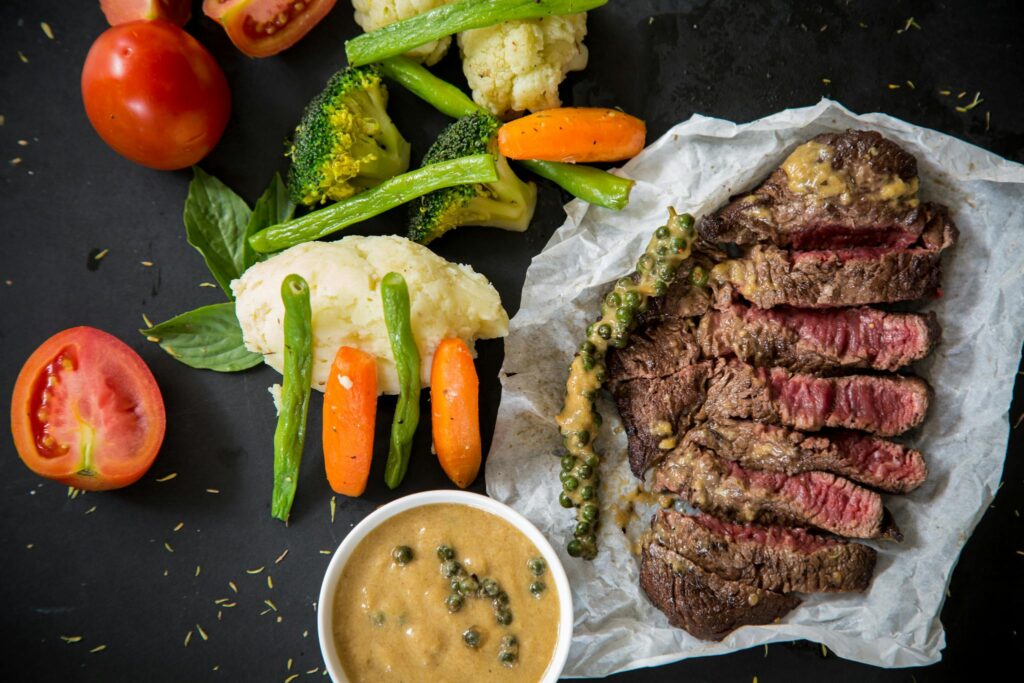
Proteins
Protein is one of the 3 macronutrients that should be consumed every day. Protein is one of the main building blocks of life, as every cell in your body contains it. Without protein, your body wouldn’t be able to repair cells and grow. Protein helps carry oxygen throughout your bloodstream and create the necessary antibodies to fight off infection.
Why do we need protein?
Proteins are made up of building blocks called amino acids. The amino acids create different proteins used to aid our biological processes and functions. The sequence of the amino acids creates the function of the protein. All the reactions in our body are regulated by proteins called enzymes. Enzymes can break large molecules into small ones, aiding in digestion and other chemical processes
Proteins regulate important bodily functions such as the creation of antibodies to support the immune system, the creation/ regulation of hormones to support bodily functions, the regulation of DNA and RNA, and to transport of essential molecules throughout the body.
Protein is also helpful when it comes to building muscle mass, gaining strength, reducing appetite, maintaining healthy weights, and boosting metabolism. Protein can strengthen your bones, reduce your blood pressure, and repair your body as it’s one of the main building blocks of your tissues – making it important for athletic performance
How much protein do we need?
Not getting enough protein can harm your health. It is recommended for adults to get at least 0.8 grams of protein for every kilogram of body weight. This means that a 140-pound adult should get at least 50 grams of protein daily. For everyone, protein should compromise anywhere from 10% -35% of your daily calories. These recommendations can change depending on age or pregnancy.
Protein Sources
Most protein comes from plant sources such as tofu, nuts, seeds, legumes, grains, and animal sources such as fish, poultry, chicken, beef, and dairy sources. However, amino composition is the most important when it comes to proteins. Most of your protein sources should be complete – containing all 9 of the essential amino acids. Complete proteins include milk, beef, poultry, chicken, fish, tofu, and more. It is best to get your protein from a combination of complete animal and plant sources. When eating protein from animal sources, try to make sure the protein is lean such as chicken, turkey, or fish. Eating red meat is fine, but too much of it can lead to heart problems over time. You can also get protein from supplements such as protein bars or whey protein but try to make the most of your protein intake based on whole sources.
Conclusion
Protein is essential for our daily life. To eat more whole protein, we must focus on incorporating more protein into our diet. You can do this by trying to snack on more protein like cheese, nuts, or Greek yogurt, adding more dairy into your diet, having a focus on eating protein first whenever you have a meal, and more!
References
https://www.eatingwell.com/article/7913446/what-is-protein-why-do-you-need-it
https://www.healthline.com/nutrition/10-reasons-to-eat-more-protein#TOC_TITLE_HDR_10
https://www.hsph.harvard.edu/nutritionsource/what-should-you-eat/protein
https://www.webmd.com/diet/benefits-protein
https://www.piedmont.org/living-better/why-is-protein-important-in-your-diet
https://www.healthline.com/nutrition/14-ways-to-increase-protein-intake#TOC_TITLE_HDR_12
https://medlineplus.gov/genetics/understanding/howgeneswork/protein